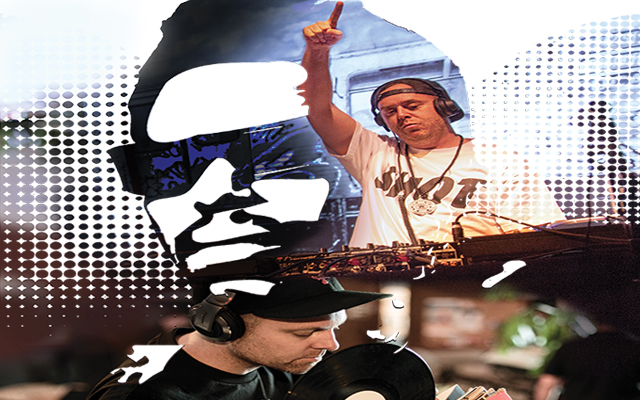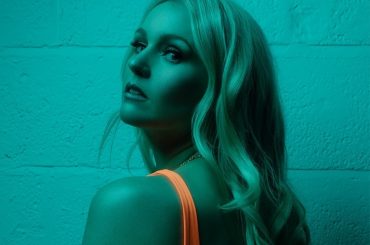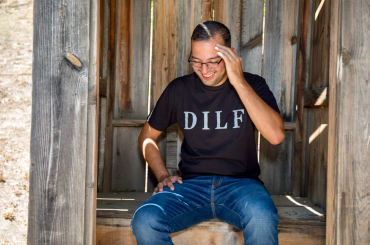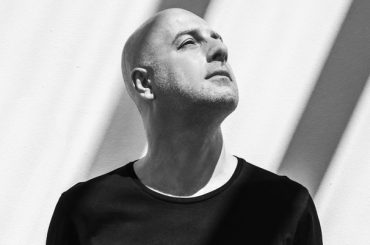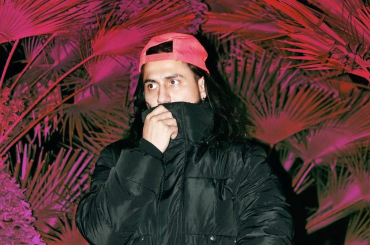New York City – This past September at Manhattan’s Irving Plaza, DJ Shadow and Cut Chemist played a pair of triumphant shows as part of their ongoing “Renegades of Rhythm” tour. Meanwhile, in the top right corner of the venue’s balcony, Afrika Bambaataa sat and observed festivities, essentially two evenings decidated solely to his legacy.
A hip-hop legend who blended classic beats for 1982’s “Planet Rock” with (at the time of its release) an emerging electro sound, Bambaataa’s renowned 40,000-some collection of vinyl records was placed in the hands of DJ Shadow and Cut Chemist to spin for this tour. The collection contains Bambaataa’s released (and unreleased) material, as well as music that influenced his decades-spanning career. (Editor’s Note: As the tour’s 24-date Stateside leg wrapped in late 2014, a new round of 17 European dates was announced for early 2015.)
DJ Shadow:
DJ Shadow (aka Josh Davis), who is best known for his direct contribution to the development of instrumental hip-hop and for his groundbreaking 1996 album Endtroducing…, sat down with us before the show to discuss the ways in which Bambaataa influenced his sound, as well as how he came to discover “Planet Rock” in his youth. He also describes how both himself and Cut Chemist (aka Lucas MacFadden) carry Bambaataa’s message, which is vital to continuing the hip-hop movement Bambaataa and others pioneered in the ’70s and ’80s.
DJ Times: Tonight is the second New York City show of this tour. How was the first show last night?
Shadow: It was an amazing honor. Bambaataa was there and it was New York City. It was a culmination of not only a year of talking about doing this, and looking through the records and setting the records aside and going through the records, but distilling what we needed from the collection and actually creating the set… to finally get to do it here and see his [Bambaataa’s] reaction just felt like a real indication of so much time and energy. It was totally rewarding as well.
DJ Times: Did you know Bambaataa would be at the show?
Shadow: I suspected he might be, but I wasn’t 100-percent sure. Being who he is, he’s kind of revered everywhere he goes. I didn’t want to just assume he would want to make the time to come and see something like this, but I was really honored that he was here.
DJ Times: What was your reaction when you first encountered him?
Shadow: I first saw him when he was DJing in the late ’90s. Because of his personality and because he’s so humble, Luke [Cut Chemist] and I both felt at ease when [Bambaataa] came in [to Irving Plaza]. He came in during sound check. Later during the show, he was seated and we were able to introduce him to the whole crowd, who cheered for him as I think they should. It was a nice moment. I still can’t really believe that after first hearing his music 32 years ago, and all the benefit I’ve gotten from his wisdom and the music he’s made… all the things he’s passed on to other DJs that inspired me… it’s just pretty amazing that last night happened.
DJ Times: How did the idea of this all-vinyl tribute come about?
Shadow: The link between Bambaataa and us is a guy named Johan Kugelberg. He’s known a lot of the Zulu Nation guys for a while and he helped broker the sale of Bam’s collection to Cornell [University Library’s Hip-Hop Collection]. And then I think from knowing Cut and I a little bit throughout the years, he just suddenly went, “Oh, you know what would be really dope? Instead of the collection just going into a vault somewhere, we have an opportunity to take at least a portion of this collection on tour.” Somebody in the last interview asked, “How do you feel about him adding more wear to the records?” And I was like, “Well, we’re doing with the records exactly what is supposed to be done.” They’re supposed to be enjoyed and people are supposed to rejoice around that music. Whether there’s pops or warps or whatever is wrong with the vinyl… I mean, that’s how it was back then. This [show] is 100-percent Bambaataa’s collection.
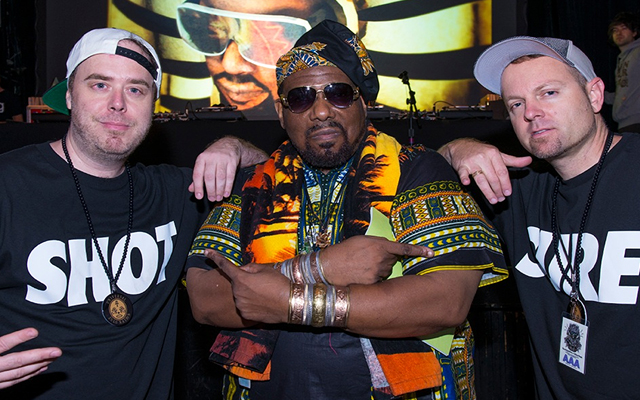
DJ Times: Is any of the vinyl in his collection unreleased?
Shadow: Yeah, there was stuff in his collection that was massively and historically significant, like unreleased old-school rap tracks from the very beginning that we didn’t know existed outside of Bam and a few other people. There were demos of his own songs that have never been heard by anyone other than him… just all this stuff where Cut and I constantly couldn’t believe what we were seeing and hearing.
DJ Times: With all those records, how did you pick which ones to play? How many were you even given?
Shadow: We were never told an exact amount when we were going through them, but people have been using the figure 40,000. That seems about right. I mean, it took us about 20 hours just to go through the records and pull the stuff that we wanted to use. A lot of it was that Cut and I feel like we are disciples of Bambaataa and we felt like we knew a lot of the records that he made famous and that he liked a lot based on the amount of times that he played them back in the day. So we went through those records, but we also wanted to tell a broader narrative about other music that was important to him as a youth in the ’70s in New York, like salsa, calypso, soca [the soul of calypso], dub… we wanted to really reflect that at least a little bit throughout the set, you know, some of the more outlined genres that made him who he is and gave him his vision.
DJ Times: So it’s more than just his music—you’re celebrating his life and history.
Shadow: Well, we feel like in honoring him and in telling his story, by default, we’re also telling the story of hip hop. His collection and his taste is one of the [most] prime [in hip-hop]… you know, if it weren’t for him, hip hop wouldn’t sound the way it does. Bambaataa, Grandmaster Flash and several others are responsible for the sonic tapestry that is hip hop, and that became very apparent going through his collection. Like, it was all there.
DJ Times: What were some of the most interesting records you found in his collection?
Shadow: Definitely some of the unreleased stuff, and there were all these acetates [discs] Bambaataa cut for himself to listen to that tell the story of how “Planet Rock” got made. “Planet Rock,” I think by no means, could ever be understated. I think it’s one of the 10 most important songs of the last 50 years. And to hear him [Bambaataa] conceiving it on these different acetates… it gets more and more realized and closer and closer to what it eventually sounded like. You can hear on one really early version a certain bassline going through it that was really interesting, but it was totally wrong for the song. And you can hear how Bambaataa obviously realized that himself because on the next version, it was gone. Something else had replaced it and other things were being tried. To hear that was amazing. You know, it’s like… if you were a Beatles fan and you got to hear the different stages leading up to the final version [of “Strawberry Fields Forever”].
DJ Times: How has Bambaataa’s sound affected your own sound?
Shadow: It’s like being a rock-n-roller and saying how Elvis Presley influenced you. It’s simple—if there were no Bambaataa, I can pretty much say there wouldn’t [be me]… he’s responsible for me doing what I do. The first rap song I ever heard was “The Message” by Grandmaster Flash and the Furious Five, and the second was [Bambaataa’s] “Planet Rock.” And it was really with “Planet Rock” where it began to dawn on me at 10-years old that there was something happening that was very different from the other R&B/soul I was listening to. It was obviously a million miles away from the rock records that were on the radio, and [“Planet Rock”] was profound enough for me at that age that I began to seek out the culture and music [associated with that sound]. Because of where I lived in California—I didn’t live in Los Angeles and I didn’t live in San Francisco—I lived in a small town and I had to seek the information. There was no Internet, obviously, so it set me on a path of… “I gotta know what this is.” I felt like I was missing something and I felt like there was a revolution happening and I couldn’t find it. It became kind of an obsession that stayed with me my whole life.
DJ Times: How were you accessing the hip-hop sound and music?
Shadow: Starting around ’83, I was seeing little news reports. I remember seeing at 11-years old a national news story about Disco 3, who later became The Fat Boys. They were just standing on a street in New York City and The Human Beat Box [the late Darren Robinson] was demonstrating the beat box. Somebody on the news deemed it worthy of being transmitted to the entire nation and I saw it, so I filed that away in my head and started hearing music in cars. My dad would take me to Pier 39 in San Francisco and I would watch the pop-lockers and listen to what was coming out of their radios, boom boxes… then I’d try to go to the record store and remember what the hook was and see if I could figure out what the record was. It was that kind of a game back then, this constant search [for a sound].
DJ Times: Do you still continue that search today?
Shadow: Yeah, definitely—on the Internet, on Soundcloud… I’m always looking for new music and new ideas and new beats.
DJ Times: How do you think the world will remember Bambaataa’s legacy, let’s say, 10-20 years from now?
Shadow: In the same way that people remember Muddy Waters’ legacy, or Chuck Berry’s legacy. He’s essential to the building blocks of American music. He towers, and I don’t think that’ll ever be diminished.
DJ Times: Are you and Cut Chemist going to continue pushing Bambaataa’s legacy once this tour wraps up?
Shadow: I think in little ways. One of the things that registered with me is [how this tour/collection affects] hip hop as a movement. I’ve always tried to carry myself in a way that benefits the movement and tried to represent the movement well. But more than anything, I think the greatest gift Bambaataa gave me is the concept to try to be brave and just be yourself, and to try not to listen to the more conservative voices. Always be searching and always be looking… that’s what I felt he’s done his whole career.
DJ Times: Do you feel like you’re passing on Bambaataa’s message?
Shadow: Certainly. In moments of doubt when I feel like I’m not doing what people want me to do or if something is maybe going too far… there have been so many moments where little quotes I’ve read from Bambaataa have reassured me that as long as I’m being true to myself, and in a broader sense, true to the movement, then things will work out.
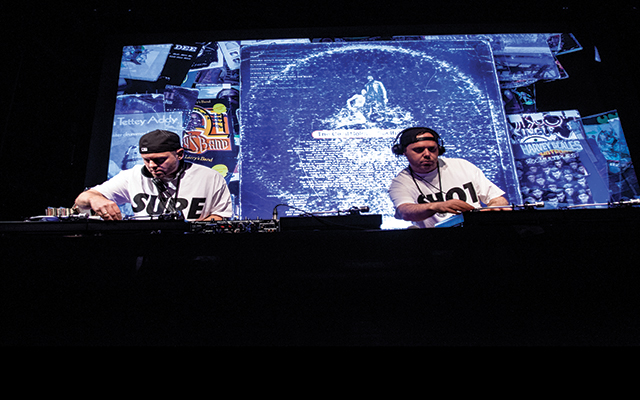
Cut Chemist:
After the “Renegades of Rhythm Tour” wrapped up its 24 U.S. dates, it was announced that Cut Chemist and DJ Shadow would be taking the show to Europe in early 2015 for 17 gigs in 13 countries. So we caught up with Cut to discuss the tour and a few other DJ topics.
DJ Times: Your take on the Irving Plaza shows?
Cut Chemist: Amazing. Having Bambaataa in attendance changed it from a show to a Romanesque experience. Having him in the balcony waving like the hip-hop royalty that he is was very surreal. I would say it was a career highlight for me. I think that energy transcended with every record we played. New York is proud of its hip-hop heritage and they let that be known all three nights that we played.
DJ Times: Gear-wise, what are you using?
Cut Chemist: Six Pioneer [PLX-1000] turntables, two Pioneer [DJM-900SRT] mixers, one 1967 Vox Percussion King drum machine and one [Yamaha DTX-MULTI 12] MIDI drum-pad drum machine.
DJ Times: In the digital-DJ age, there’s so much discussion of authenticity. Do you think that talk offers some subtext to this tour and its popularity?
Cut Chemist: People might use the word authentic when it comes to us because the era we come from is thought of as such. We started collaborating in 1998-99 when the turntablist was at an all-time high. Also, our collaborations focused not only skills, but music. The sharing of newly discovered old music is the most authentic thing you can do when DJing. That is what Bambaataa was doing in the ’70s and ’80s. When I asked to pair up with Shadow to do Brainfreeze [in 1999], it was to highlight both turntable and digging skills. Back in the ’90s, there weren’t many mix tapes combining crab scratching with deep crates. Certainly none that placed the limitation on themselves of using all 45s. Now it seems every town in the world has an “All 45 Night.”
DJ Times: Do people get too bent out of shape over the evolution of the DJ and its technology changes?
Cut Chemist: Evolution will always be challenged no matter what the context is. There will be a day when USB sticks will be defended as superior to whatever newer technology replaces it. It’s never ending because technology keeps changing. Do we want it to stop? No. That’s a ridiculous notion. I invite all methods of performance by DJs whether it’s vinyl, software-based, or CDs. I feel most comfortable with vinyl because that was the only medium available when I learned how to DJ. A kid learning today most likely would not be the same case, and that’s fine. You do the best you can with the tools you have. The tool of this generation is software-based DJ programs.
DJ Times: What was your initial reaction to the digital revolution’s changes?
Cut Chemist: I embraced it pretty heavily. I was able to play my own productions on Serato as soon as I made them. In the vinyl days, I used to have to cut acetate dub plates, which were heavy and expensive. It also made it easier to bring hundreds of songs, as opposed to lugging crates around the globe. The bad side is that my computer might crash and I would lose everything. There’s always a price to pay for convenience and that was it. I learned to bring a little bit of every format in my sets—vinyl, CDs and hard drive.
DJ Times: For some of the younger DJs and fans especially, there’s a real educational element to this tour.
Cut Chemist: There is an educational element to every aspect of this tour. The academic world now recognizes hip-hop culture and these records are the artifacts that lie in the same vault as the Gettysburg Address and ancient Mesopotamian tablets. That’s just the records. The arrangement of the set is somewhat of a timeline of how hip hop progressed from playing records with breaks at jams to a recording industry—an industry largely due to Bambaataa’s vision and productions in the early ’80s. The arrangement of the set handles each section faithfully to each era to where I think it serves as good examples of what songs were played together from era to era. I can speak for the ’83-’84 era section, first hand. I was there in the clubs at that time in L.A. and I get a little misty that it’s so on point of how things sounded back then.
DJ Times: Your fondest memory of that time?
Cut Chemist: DJing with Shortkut in ’96 at Future Primitive in San Francisco. We had just met that night and it was all improvised. The crowd was amazing and I had just got the “Open, Close” record from Cool Chris at Groove Merchant that afternoon. I ended up whispering to Short, “I’m gonna throw on this kids record where the beat speeds up and slows down, just follow along…” And he killed it. To this day, it’s still a routine in the Jurassic 5 live shows that I now do with DJ Nu-Mark.


